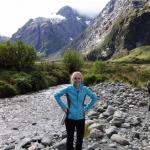Last semester I studied abroad in Cairns, Australia. Thanks to the enormous generosity of several St. Lawrence donors, I was also able to travel to New Zealand during my mid-semester break through a travel enrichment grant. My intended plan for New Zealand was to hike the Milford Track Walk for four days and also do other hikes in the area. The Milford Track walk ended up being far more expensive than my previous research had led me to believe and therefore I did not end up undertaking the Milford track walk. Instead I completed several related outdoor activities in New Zealand. Firstly, I was still able to experience the immense beauty of the Milford sound by boat instead, and did two other hikes around the Queenstown area. Specifically, through a touring company, I was able to travel across the sound by boat and then kayak around the water of the Milford sound. While kayaking, was able to look up at the stunning mountains and surrounding ecosystems. I found the natural area of the Milford Sound to be the most picturesque sight I’ve ever seen and educationally fascinating. The natural area consisted of the water of the sound itself, surrounded by a small beachy shore, encircled by mountains topped by a rainforest, with taller peaks in the background. As an environmental studies major, I found the ecological adaption that allows trees to grow out of the side of cliffs, enthralling. Additionally, seeing that this incredibly beautiful array of intersecting ecosystems was essentially untouched by human kind was inspirational. If human society has the capacity to preserve this natural wonder, perhaps the world has the capacity to preserve other rare ecosystems around the world and solve other more complex environmental issues as well.
The two hikes I took, one in Queenstown and one in Arrowtown, gave me a deeper understanding of the natural environment in New Zealand. The differing plant life, and simply the magnificence of the geophysical landscape of New Zealand put the fight back in me to pursue a career as an environmental advocate. Furthermore, seeing the way in which the man-made trails combed through nature was interesting to me. The hike in Arrowtown was steep and narrow which made it challenging but necessary ecologically. The nature of the trail forced hikers to stay on the path and not create additional environmental destruction by destroying micro ecosystems around the hiking trail. In sum, this travel experience has added an overall richness to my environmental studies major as a whole because it has given me tangible ecological knowledge about ecosystems in New Zealand and the way in which these ecosystems are managed. Because ecotourism is the biggest industry in New Zealand, it is in the country’s best interest to preserve their natural spaces. The pristine quality of the beautiful wilderness spaces in New Zealand, and the country’s resultant thriving ecotourism industry, show the world that capitalism and environmental preservation don’t always have to conflict. This theme is directly correlated to my environmental studies/sociology major program. I am very grateful to have had this fulfilling travel experience.
